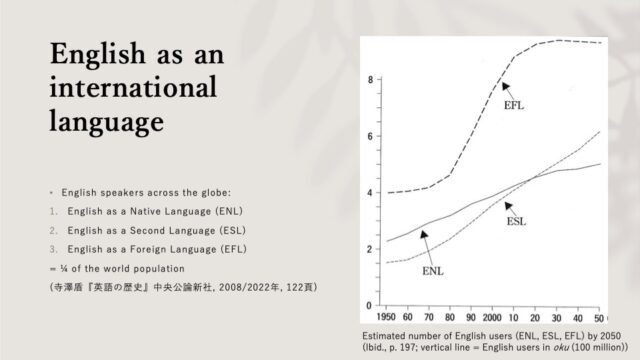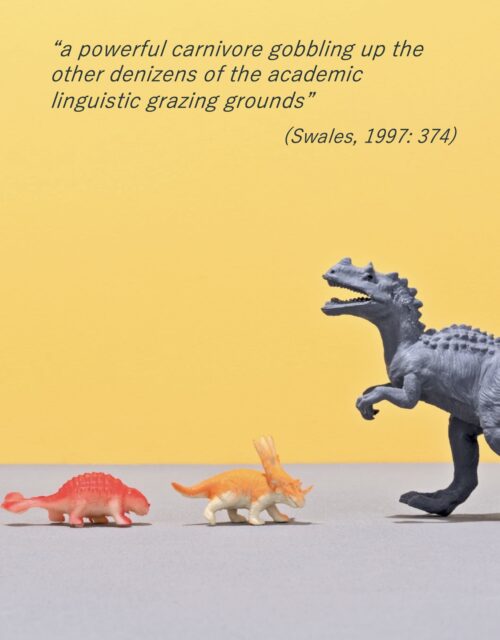The EAA is a remarkable platform where students from East Asian countries stand as a beacon of intellectual enrichment at Komaba. Central to this dynamic exchange is the shared medium of language. However, a compelling question looms large: why do East Asian students opt for “English” for their intellectual endeavors and social interactions in this setting? It may be argued that languages such as Chinese or Japanese could serve as viable alternatives, but the complexity arises when students from three or more countries converge. In such cases, the utility of English becomes undeniable. Yet, as we find ourselves entrenched in the habit of using English, the time is ripe for us to pause, reflect, and reevaluate the role and significance of “English” within the realm of academia, and more specifically, within the unique context of EAA.
With this inquiry, we facilitated a venue to discuss this by having Dr. KATAOKA Mai, EAA project research fellow, whose expertise lies in Japanese literature and translation, as a speaker, on November 9, 2022. Dr. Kataoka’s talk delved into the broader concept of English as a lingua franca and its specific role within academia. Her insights offer valuable perspectives for us to contemplate the intricate relationship between English and academia, and, in particular, its significance within the context of EAA. You can find further details of her talk below.

As is widely recognized, English serves as a global lingua franca across various domains. Its prominent role in this capacity emerged relatively recently, solidifying after World War II. Lingua franca, historically, has transitioned from Sabir (11th-19th centuries) to Latin, then French (17th-20th centuries), and now to English, which reigns supreme. The number of English users has surged, exceeding tenfold compared to before. In detail, the population of English users, primarily categorized in English as foreign language, now nearly doubles the combined population of native and second-language English speakers (the slide above). In total, one-quarter of the world’s population employs English across diverse contexts, particularly in industries like Airspeak and within diplomatic circles, including organizations such as the United Nations (UN), NATO, and the Organization of the Petroleum Exporting Countries (OPEC), which officially adopt English as a working language. Notably, OPEC, despite the absence of any native English-speaking member states, has chosen English as its official language.
Against this backdrop, English has emerged as the predominant and crucial medium for disseminating scholarly work. Academic papers, particularly journal articles, are overwhelmingly written in English, and it is imperative for researchers to publish their work in this language. As a result, nearly 90% of academic papers are published in English (Terasawa 2008; 2022:8).
Given the dominant role of English as a lingua franca in academia, often referred to as English hegemony, there has been simultaneous criticism. Some critics denounce English as a ‘Tyrannosaurus rex,’ emphasizing the need for resistance against the ‘triumphalism’ of English, a responsibility that falls upon English for Academic Purposes (EAP) teachers (Swales 1997). Additionally, English has faced criticism for its impact on epistemologies, which has led to what some term ‘epistemicide’ or epistemological destruction, a concern notably raised by translation researchers (Bennett 2007; 2013). In this context, translation is regarded as one of the tools to challenge the dominance of English.
Taken together, the debate surrounding English hegemony serves as a catalyst for raising awareness and exploring alternatives to the dominance of English in academia. For instance, the International Comparative Literature Association (ICLA) employs multiple languages, including English, French, and the host country’s language, as a means to address this issue. They acknowledge and accept the role of English in international communications but at the same time promotes the multilingualism in academia.

As we shared our individual experiences with English, particularly the challenges and struggles we’ve faced, our awareness of the relationship between English and academia has become more pronounced, thanks to Dr. Kataoka’s insightful talk. Through this dialogue, we reconnected with our shared objective: to explore the connection between English and academia within the framework of EAA—a place that serves as a vital platform for students deeply rooted in East Asian culture, multilingual in their abilities, yet predominantly reliant on English for intellectual discourse and camaraderie. Although this conversation didn’t provide us with definitive answers to our challenges, it did offer a sense of relief, knowing that our shared sentiments are not isolated, and it has created a space for future discussions on this important issue.
<References>
Bennett, Karen (2007) ‘Epistemicide! The Tale of a Predatory Discourse’, The Translator 13(2): 151 – 69.
——————-(2013) ‘English as a Lingua Franca in Academia’, The Interpreter and Translator Trainer 7 (2): 169-93.
Swales, John M (1997).‘English as Tyrannosaurus rex”, World Englishes 16 (3): 373-382.
寺澤盾『英語の歴史』中央公論新社, 2008/2022年 [Jun Terasawa (2008/2022), The History of English, Tokyo: Chuokoron Shinsha)
KOO Yoojin (EAA Project Associate Professor)








